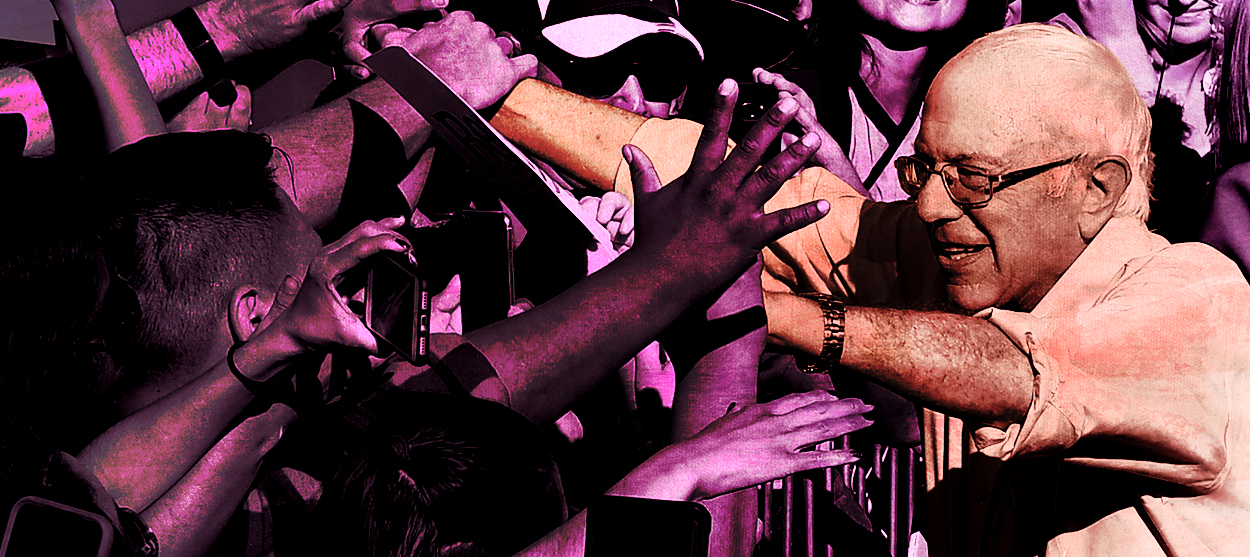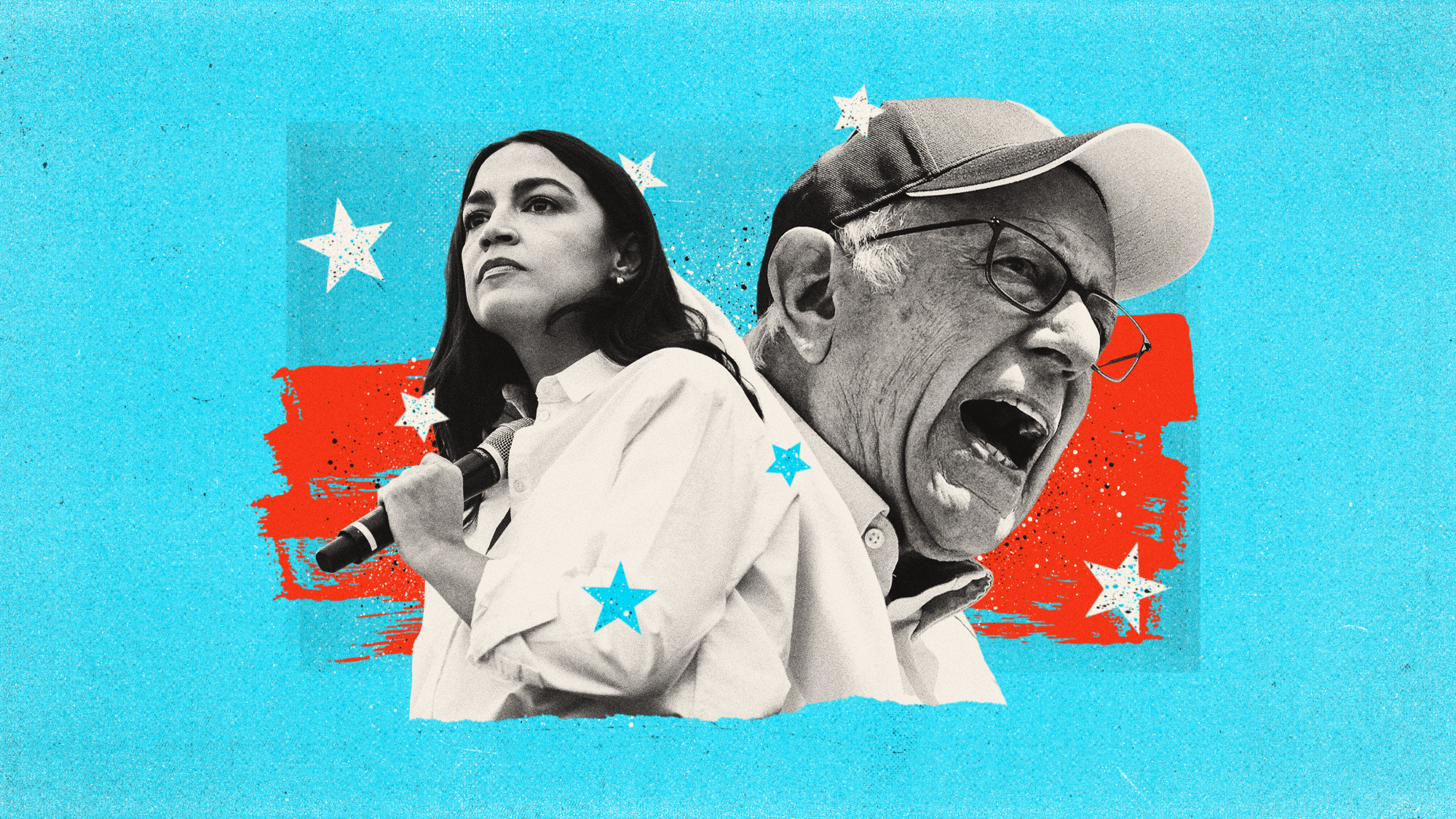Bernie Sanders and the socialist Christmas spirit
Too many Americans take on guilt and shame over things that are not their fault


A free daily email with the biggest news stories of the day – and the best features from TheWeek.com
You are now subscribed
Your newsletter sign-up was successful
During the Great Depression, farmers facing terribly low crop prices, or no buyers at all, were forced into foreclosure by the thousands. Some local communities looking for some way to protect themselves from financial apocalypse hit on the "Penny Auction," where during a foreclosure auction anyone bidding more than a few cents would find a heavy, unfriendly hand on his shoulder, and retract the bid with a squeak. One whole farm, equipment and all, was disposed in such a way for a mere $5.35. Then the "winners" would return all the property to the original owner for free.
The idea of this kind of angry collective solidarity has been systematically beaten out of the American imagination over the last several decades. But Bernie Sanders is attempting to bring back that old solidarity spirit — allowing not just for the possibility of drastic political change, but rebuilding some of the frayed bonds between the American citizenry and their government. It's a surprisingly warm message for the holiday season, coming from a famously rather cranky politician.
Let's compare that 1930s auction story to a recent medical billing story. In July 2018, a California man named Tom Saputo with a rare lung disease stopped breathing. A normal ambulance took him to a local hospital, and four days later he was airlifted to UCLA specialists, where he got a double lung transplant. His insurance covered the procedure, which cost $40,575, including $31,605 for the surgeon. That price is probably high by international standards, but to be fair a double lung transplant is an extraordinarily difficult and complex procedure.
The Week
Escape your echo chamber. Get the facts behind the news, plus analysis from multiple perspectives.

Sign up for The Week's Free Newsletters
From our morning news briefing to a weekly Good News Newsletter, get the best of The Week delivered directly to your inbox.
From our morning news briefing to a weekly Good News Newsletter, get the best of The Week delivered directly to your inbox.
But the air ambulance company, Mercy Air — which carried him a piddling 27 miles — charged far more: $51,282. And because it was out of his insurance network, the company stuck Saputo with the balance bill of $11,525. As he was recovering from the grueling operation, they harassed him constantly, calling him, his wife, and his daughter, and trying to pressure him into setting up a payment plan.
We should be clear about what sort of business this is: namely, a legal extortion racket. Like most air ambulance companies, Mercy Air is owned by a private equity firm, and it is no coincidence they were out of Saputo's insurance network. As an Anthem spokeswoman told Kaiser Health News, they often choose to do so in order to be able to bill patients "whatever they choose." (Though Mercy Air later signed a contract with Anthem.) These firms worm their way into hospital contracts, and then whenever somebody is desperately ill and needing an emergency flight, they can be soaked for their every last red cent. Private equity goons have done the same trick with regular ambulances across the country, with devastating effects both for prices and for service quality.
Just thinking about real resources exposes what is happening here as well. You can rent a medium-size helicopter for a few hundred dollars an hour. There is no way five minutes of time on ambulance medical equipment plus a couple EMTs to watch vital signs actually costs $50,000. A few bankers are quite literally making out like bandits here.
But while this story — and there are literally thousands more like this, happening every day — got some media attention, there was no broader populist backlash. There were no torch-wielding mobs on Wall Street or Capitol Hill demanding drastic changes to medical pricing. Nobody was personally threatened or even much criticized. It's all somehow a complicated policy dispute, not medical gangsterism.
A free daily email with the biggest news stories of the day – and the best features from TheWeek.com
The reason none of that happened is the neoliberal mindset that held hegemonic sway in the United States from about 1980-2008. By this view, economic events are always under one's personal control — if you get foreclosed on, or lose your job, or face some massive medical expense, it's your fault by definition. Modern Americans facing a turn of bad economic luck often turn the pain inwards, blaming themselves for their plight instead of organizing together to defend themselves. As economist Steve Randy Waldman writes, American economic victimization "is relegated by custom and practice into the sphere of the 'private,' the sort of bureaucratic struggle one quietly hires professionals to deal with and hides as much as possible from friends and coworkers." Even when people don't accept blame, they struggle to get attention, much less mass support, in the face of such an enervating, atomized mindset.
Now, Bernie Sanders is attempting to resurrect that older American spirit — in the broadest socialist tradition, thinking not just about the economy narrowly, but about how a nation relates to itself on a fundamental level. As Ruby Cramer writes in an excellent profile at Buzzfeed News, in contrast to the mass rallies and speeches that he gave during his 2016 run, this time:
He is trying to change the way people interact with private hardship in this country, which is to say, silently and with self-loathing. He is trying, in as literal a sense as you could imagine, to excise "shame" and "guilt" from the American people … Bernie says he is trying to "redefine our value system." Jane [Sanders] talks about breaking down decades of societal muscle memory: "It seems to be the American way," she says. "That we all think it’s our fault — instead of recognizing there is a system that is making it unfair for them." They are, as they see it, trying to dismantle the ideal of "rugged individualism," an entire era of political thought. [Buzzfeed News]
Individualist ways of thinking do have a long American history. But the collectivist tradition is just as strong. Abolitionists built a ferocious movement against slavery in the mid-19th century. Populists, socialists, and union organizers banded together to demand government action to rein in ruthless monopolists in the Gilded Age and the New Deal. Civil rights groups did the same against Jim Crow in the 1950s and 60s. There is no reason Sanders couldn't rekindle the embers of that old ideology.
Indeed, if you just stop to think for a moment, it is preposterous to believe one can fully determine one's economic fortunes. When a factory is shipped to Mexico, or a financial crisis throws millions out of work, or somebody gets a $11,000 bill because they fell sick, no amount of learning to code would have helped the people trampled under the tank treads of capitalism.
It is only when someone has been conditioned to believe solutions are impossible that they will just sit and take such punishment. And Wall Street likes it that way. They want depressed and anxious sheep who can be sheared without a peep.
So perhaps this Christmas, think about Bernie Sanders and his peculiar program of socialist political therapy. The problems facing America are severe indeed, but they are also eminently solvable. As George Bailey says in that classic piece of American Christmas culture, "We can get through this thing alright. We've got to stick together though, we've got to have faith in each other."
Want more essential commentary and analysis like this delivered straight to your inbox? Sign up for The Week's "Today's best articles" newsletter here.
Ryan Cooper is a national correspondent at TheWeek.com. His work has appeared in the Washington Monthly, The New Republic, and the Washington Post.
-
 Political cartoons for February 16
Political cartoons for February 16Cartoons Monday’s political cartoons include President's Day, a valentine from the Epstein files, and more
-
 Regent Hong Kong: a tranquil haven with a prime waterfront spot
Regent Hong Kong: a tranquil haven with a prime waterfront spotThe Week Recommends The trendy hotel recently underwent an extensive two-year revamp
-
 The problem with diagnosing profound autism
The problem with diagnosing profound autismThe Explainer Experts are reconsidering the idea of autism as a spectrum, which could impact diagnoses and policy making for the condition
-
 The billionaires’ wealth tax: a catastrophe for California?
The billionaires’ wealth tax: a catastrophe for California?Talking Point Peter Thiel and Larry Page preparing to change state residency
-
 Mamdani vows big changes as New York’s new mayor
Mamdani vows big changes as New York’s new mayorSpeed Read
-
 Bari Weiss’ ‘60 Minutes’ scandal is about more than one report
Bari Weiss’ ‘60 Minutes’ scandal is about more than one reportIN THE SPOTLIGHT By blocking an approved segment on a controversial prison holding US deportees in El Salvador, the editor-in-chief of CBS News has become the main story
-
 Has Zohran Mamdani shown the Democrats how to win again?
Has Zohran Mamdani shown the Democrats how to win again?Today’s Big Question New York City mayoral election touted as victory for left-wing populists but moderate centrist wins elsewhere present more complex path for Democratic Party
-
 Millions turn out for anti-Trump ‘No Kings’ rallies
Millions turn out for anti-Trump ‘No Kings’ ralliesSpeed Read An estimated 7 million people participated, 2 million more than at the first ‘No Kings’ protest in June
-
 Ghislaine Maxwell: angling for a Trump pardon
Ghislaine Maxwell: angling for a Trump pardonTalking Point Convicted sex trafficker's testimony could shed new light on president's links to Jeffrey Epstein
-
 The last words and final moments of 40 presidents
The last words and final moments of 40 presidentsThe Explainer Some are eloquent quotes worthy of the holders of the highest office in the nation, and others... aren't
-
 The anger fueling the Bernie Sanders and Alexandria Ocasio-Cortez barnstorming tour
The anger fueling the Bernie Sanders and Alexandria Ocasio-Cortez barnstorming tourTalking Points The duo is drawing big anti-Trump crowds in red states
